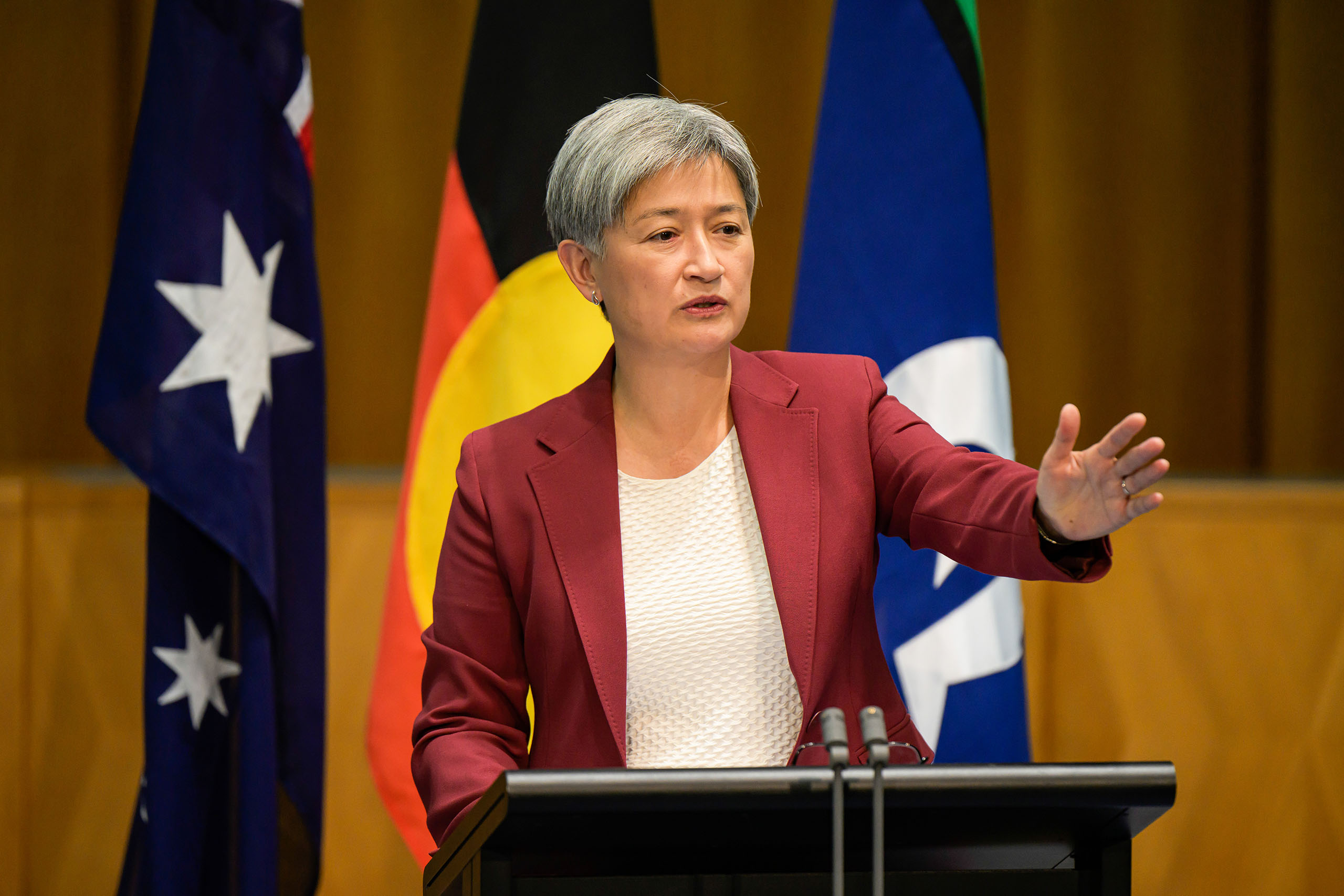What Australians witnessed this week in the encounter between foreign ministers Wong and Wang was a combination of Peking Opera, Kabuki theatre and that great Australian theatrical device, the shirtfront.
Penny Wong is well-suited for all these roles, alternating between the higher-intensity Peking opera, the low-intensity Kabuki form, and the diplomatic shirtfront. Thus, she said she was disturbed by China’s confronting behaviour in the South China Sea, concerned about China’s human rights abuses and “shocked” by the suspended death sentence meted out to Australian citizen Yang Hengjun for allegedly spying.
Having got that off her chest, she was also pleased that relations between Australia and China had “stabilised” under the Albanese government, enabling the resumption of what diplomats call a high-level foreign and strategic dialogue. That process had fallen into disuse under the more combative and, as it turned out, less constructive approach taken by the previous Australian government.
As for Wang Yi, the Chinese foreign minister provided a relatively enigmatic foil in his public encounters with Australian leaders, including Wong and prime minister Anthony Albanese. In private, he will no doubt have given as good as he got: as a long-serving foreign minister he is no stranger to difficult encounters triggered by China’s assertiveness.
Wong and Wang won’t have neglected the implications of an extremely unstable global security environment for regional peace and stability. While they may not have dealt directly with a possible return of Donald Trump to the White House, it will have been part of their calculations about what lies ahead.
Offstage we had a staple of Peking opera, with a villain in the shape of Paul Keating, whose meeting with the Chinese foreign minister was portrayed in some excitable media quarters as treason. In a world of high-stakes diplomacy in which one of Beijing’s stocks-in-trade is divide and prevail, the meeting with a former prime minister who is a critic of Australia’s China policy will have served a symbolic purpose.
What was achieved by all this activity?
The answer is straightforward. The Wong–Wang meeting served both countries’ interests. For Australia, it demonstrated that relations with its cornerstone trading partner are in mutually beneficial shape. For China, it suggested Canberra had not moved irredeemably into Washington’s orbit.
The encounter was realpolitik writ large in preparation for a visit to Canberra later this year of Chinese premier Li Qiang. To use a phrase borrowed from Chinese leader Xi Jinping, it had a win–win outcome for the two countries, though not for Australia’s China hawks.
Much of this movement, including an easing of restrictions on Australian exports to China, would have been off limits under Scott Morrison’s government — a time when Australia’s trade minister could not get his counterpart on the telephone.
In the eighteen months since Labor took office, bilateral encounters have occurred monthly at least, and with increasing frequency more recently. Contrast this with the paucity of meetings, invariably restricted to encounters on the sidelines of international gatherings, under Morrison.
Absent from Wong’s remarks about the relationship on this occasion was the bromide that Australia would disagree with China where it must, and agree where it can, or words to that effect. Increasingly, we now have Wong saying that Australian wants a “stable and constructive” relationship with China “in the interests of both countries.”
This might be bad news for those critics of China who have put us on a “red alert,” as a febrile newspaper series in Age and the Sydney Morning Herald described it last year. A “constructive” relationship would seem to be in Australia’s own interests, though it shouldn’t be at the expense of Australia’s treaty arrangements, its national interest or its values — a fact that shouldn’t need to be repeated ad nauseum.
In their quite lengthy talks Wong and Wang will have dwelled no doubt on a trading and people-to-people relationship that has rebounded since the Covid crisis subsided. Goods and services exports to China gained 13 per cent to A$203.5 billion in the 2022–23 financial year, with China accounting for a shade over a quarter of total exports. Service exports to China were up 27 per cent as a result of the return of students and tourists. The country is far and away Australia’s biggest export market.
If there is an impediment from China’s point of view, it is the obstacles facing Chinese enterprises attempting to gain a foothold in Australia’s investment market by the Foreign Investment Review Board. China’s investment stock in Australia stands at just A$44 billion, or 4 per cent of total foreign direct investment. It ranks sixth among foreign investors, far behind the United States, the European Union and Britain.
Among jarring aspects of Wang Yi’s visit, and one that raised questions about China’s willingness to engage more broadly, was the foreign minister’s unwillingness to avail himself of the opportunity to answer questions from the Australian media. Wang and his advisers won’t have overlooked the hostile tenor of some of the reporting ahead of his visit, and the near certainty that this hostility would have permeated an encounter with an Australian media loaded for game.
In all of this, participants in the diplomatic jousting will continue to play their roles for both a domestic and a wider audience. Senator Wong is proving quite good at it. The question, as always, is how much substance is there behind the shadow play. •




